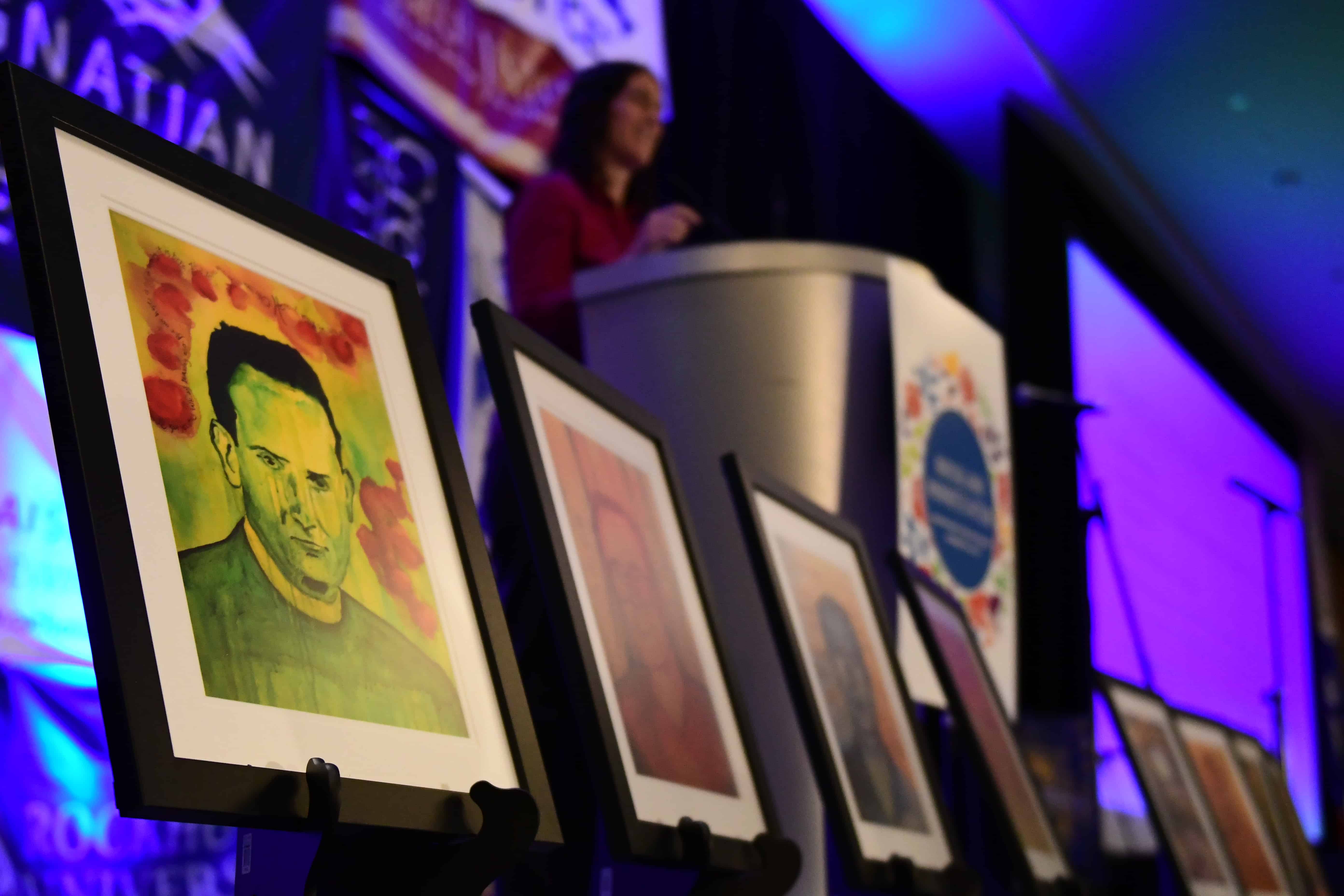On Saturday, November 16th, two thousand students came to Washington D.C. for the 22nd annual Ignatian Family Teach-In for Justice (IFTJ) hosted by the Ignatian Solidarity Network.
IFTJ is the largest Catholic social justice conference in the country. It features breakout sessions and keynote speakers addressing issues including immigration policy, environmental justice, and systemic racism.
The event concludes this morning with a public witness at the capital, as delegations of students meet with representatives in Congress to speak to them about just immigration and environmental policies.
Delegations came from high schools and colleges around the country, including the majority of the Jesuit schools. Beyond the U.S., there were also students from Mexico, El Salvador, Canada, and Portugal.
Check out the video of keynote speakers Sr. Peggy O’Neill, S.C., from the Center of Arts for Peace in El Salvador, Fr. James Martin, S.J., editor at America Media, Marcia Chatelain, Ph.D., from Georgetown University, and Reyna Montoya, CEO of Aliento.
Here are a few highlights from the talks:
Francisco Mena from Crispaz
“When we remember what these people have lived and died for, we find ourselves empowered to follow their example – and to hope even when it seems no reason to have hope.”
“As Christians, we must recognize that we live in a world filled with numerous groups and communities who are facing systemic oppression, and we must act.”
Vrushangi Shah from Saint Louis University
“If you aren’t here to serve those who need to be served, what is the point of your serving?”
Chloe Becker from Magnificat High School, who painted a mural of African saints at her school
“Working toward the holiness of the saints calls for working for justice because love requires justice.”
“Lean into discomfort. We cannot solve the problems at hand by being nice and feeling comfortable.”
“Jesus is working among us. There is no neutral ground. Let’s make our country Kingdom ground.”
Sr. Peggy O’Neill, S.C., Center of Arts for Peace
“Right now, nothing is more dangerous than giving up hope.”
“Tonight we share our food, tomorrow we share our hunger.”
“God is the dance, not the dancer.”
“I dare you to be midwives of solidarity. Get a life where you are not alone. Find people who you love and who love you.”
“I like questions that have no answers more than answers I cannot question.”
“We need an environmental revolution. We need a trinitarian revolution. We need to change the vibrations of this planet, and to do that we need to change our inner vibrations…We are all responsible for all.”
“Trinitarian faith says that God is love relationship itself. Trinity is not just a teaching about God, but also about personhood…We are not mere spectators, we are invited into this three-part harmony, this divine relationship.”
“Mystery is not something you cannot understand. Mystery is something you can understand endlessly. There is no point at which you can say ‘ah ha, I’ve got it.’”
“Anchor yourself in what is right, what is true, loving, and kind…close the gap between the world we have and the world most people long for.”
Fr. James Martin, S.J., editor at America Media
“Pope Francis spent 30 minutes with me, and we talked about LGBT Catholics, their joys, their struggles, and he was attentive…I left filled with consolation.”
“It might be good to look at the Gospels once in a while and see how Jesus treated people…An extension of mercy to marginalized people always makes some folks angry.”
“We should rejoice that more LGBT people are feeling at home in our parishes…as more and more people come out, more families are affected, and things change for the better…this trend will not stop.”
“We’re all brothers and sisters. God lives in you. God lives in me. We’re all connected in that way.”
Emma Menchaca-Chavez and Regi Worles from Regis University in Denver, CO
“Our hope it that by sharing our message with you, we may bring all of us – not just queer people – from the margins into wholeness.”
“We have to decide what it means to be with and for others. We hope to explore what loving wholly looks like.”
Danny Gustafson, S.J. from Boston College
“God saw, God sees, what is going on in the world. And how does God respond? By choosing to get involved.”
“Jesus wasn’t afraid of having conversations with people who disagreed with him…rather than blocking them on Twitter, he engaged them in conversation.”
“A fundamental truth of democracy is that decisions are made by those who show up. If you want to see change, you need to show up.”
“If you want to see change, you need to show up. For those who are able: vote. No excuses, no qualifiers. Vote.”
Joanna Williams from Kino Border Initiative
“In 2006, my undocumented high school classmate walked out of class in protest of the criminalization of immigrant people. She risked her life and her security, and I couldn’t even risk an unexcused absence.”
“We must create a pathway to citizenship for young people in our country right now.”
“Congress doesn’t care [about migrants] because they haven’t heard from their constituents. They heard about it when children were being separated from their families, but they aren’t hearing about it now.”
“Remind your senators and representatives that they have power, and you expect them to use that power.”
Marcia Chatelain, Ph.D. from Georgetown University
“Mr. Ledell Lee refused the traditional last meal offered death row inmates, and he instead received the sacrament of the Eucharist.”
“His choice of the Eucharist, and its interpretation as a refusal of the state’s idea of what the last meal should be, provides us with a powerful way of examining faith in a world that tries to make us see each other and ourselves in the starkest ways.”
“One of the greatest privileges and burdens many of us face is that of choice. We can choose what we learn more about, what we resist, we choose our relationships, how to spend our time. We choose.”
“We have the capacity to decline the empty fuel of the world for the true nourishment of our spiritual conviction.”
“Jesus’s example helps us understand – not just love in action, but the radical refusal to say no to the idea that injustice, cruelty and desertion is just a consequence of life.”
“To renounce the empty wealth of seeking money and power instead of the wealth of the spirit, we are forced to make these choices every day, in who we say hello to and where we avert our eyes. Who we welcome and who we repel. What we purchase and what we abstain from consuming.”
“Radical hope isn’t just about what we desire, what we hope for without limits. Radical hope is also about what we choose in order to honor our hope and the hope of others.”
Ben Campion from Gonzaga College High School in Washington D.C.
“We humans are fragile and dependent on the earth God has given us. Our modern world is built on the notion that we have a right to exploit mother Earth.”
“Our poor brothers and sisters are suffering the effects of global warming. Their livelihoods are being destroyed by intensified natural disasters. We can and must fix our systemic abuse.”
“It takes only 3.5% of the population active in protests to create positive social change. Our generation – Generation Z – is 27% of the American population. We can make a difference.”
“If we don’t wish ourselves to be the best we can, then who will?”
Arlin Téllez Montoya from Washington Trinity University
“The laws of man are not the same as the divine laws of Jesus Christ.”
“When I was a senior, I told my guidance counselor about my status and didn’t receive any help. Senior year became the most lonely year of my life. Everyone turned their backs against me. They hid their xenophobia and racism within a false interpretation of the Gospel.”
Reyna Montoya, CEO of Aliento
“I started feeling so angry at my parents for bringing me to a country where I was being judged for my accent and appearance, rather than my values and my character…Now that I’m older, I have nothing but gratitude and admiration for my parents and their choices – their courage has inspired me to stand with you today.”
“I was holding a shiny award [for “Most Outstanding Undergraduate Student”], but looking down. I felt so hopeless because I knew I would walk away from that stage still undocumented…But then I looked up, and my mom and dad had smiling face, and I learned that no matter what the politicians want to do to me, I had done my job by getting my education.”
“We are beings of life. We are beings of hope. Let’s not forget to see each other eye to eye. My humanity is tied to yours. Your humanity is tied to mine.”
“I truly believe if we shine our light together we can overcome any darkness.”
“We’re not victims. We’re survivors. We need allies willing to stand with us, not for us…You have the choice to be someone who stands in solidarity. I hope you choose to stand in solidarity.”
Fr. Bryan Paulson, S.J., Provincial of the USA Midwest Province of the Society of Jesus
“We ought to spend our lives for the Lord Jesus Christ. And we need to die to whatever prevents us from serving Christ. Ad Majorem Dei Gloriam.”
“Jesus is asking each of us: What part of the grain of our life needs to die so that there may be new life? He’s not asking just once, but over and over again.”


